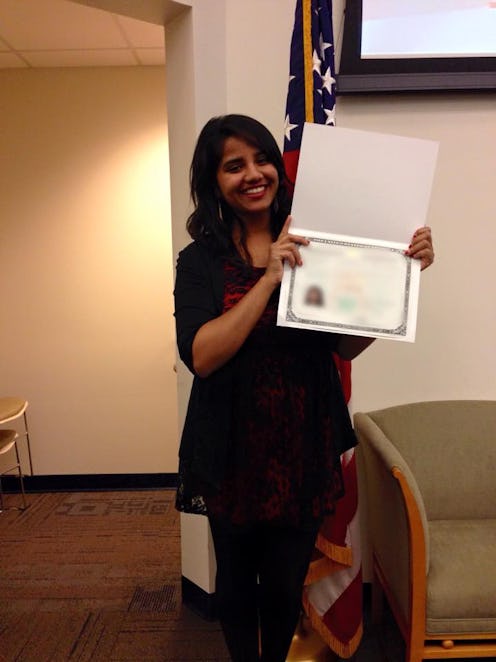
On April 29, I walked into a giant hall at the Chicago USCIS Field Office and became an American. Well, at least on paper, anyway. I was born in India, but despite having moved to the U.S. when I was two years old, I didn't obtain my U.S. citizenship until very recently. For all intents and purposes, I've been American my whole life, but despite the naturalization ceremony being little more than a formality, I felt like something in my life had permanently shifted. And with the Fourth of July approaching, a brief reflection on what citizenship means — and all the privileges that come with it — would not go amiss.
Taking the oath of allegiance, in a room lined with American flags, was bittersweet. I was finally an American citizen, but I was also letting go of the Indian citizenship I had held for nearly 21 years. The ceremony itself was an event of pomp and circumstance. We were congratulated for arriving at this historic moment, and a short film showcasing American diversity segued into a video message from President Obama.
Nothing really changed for me at that particular moment, but as I gazed around the room, I recognized how hard so many people had fought to be in that room. And when I think about the continued violence and oppression faced by undocumented immigrants in particular, there is no room for ignorance; American citizenship is a remarkable privilege.
When we talk about immigration, we need to be able to talk about how the axes of race, gender identity, socioeconomic status, and so on intersect to inform immigrant experiences. My family came to the U.S. because my dad had a job in California as a software engineer. It was a scary time for us — my parents were leaving their native country for the first time to go to a place where they knew few people. But I have been privileged growing up. I wanted for very little, and as the only child of well-educated parents in Silicon Valley, my experience as an immigrant, though riddled with racial microaggressions, was not a particularly difficult one.
It was only when I left California to go to school in the Midwest and became engaged in activist communities that I realized my experience was a unique one. It was also around that time that I become more cognizant of the privileges I lacked as a non-American citizen. I am politically active and frequently participate in protests and political campaigns, but not being able to vote was something that I felt came to define me. Imagine constantly pushing back on structural violence and inequality when the only tool I had was my voice, and not the power of a vote. A voice is powerful, don't get me wrong, and I use my writing to fight for justice, but I think voting is an important tool in vocalizing marginalized perspectives and dismantling oppressive institutions from within.
But I'm registering to vote this week, and in 2016 I will finally be able to vote in the presidential election, as well as other smaller — though no less important — ones. I believe that I have an obligation to speak up, as an immigrant myself and as an ally to other immigrants from all walks of life. Every year, when I watch the fireworks on Independence Day, I think about how many people are still denied their basic rights, but I also think about how there are so many incredible people fighting for social change and equality, and I am empowered.
The day I became an American citizen, the USCIS officials presiding over the naturalization ceremony called out the names of many different countries, and one by one, people stood up as the countries of their former citizenship were named. Becoming a citizen is a tedious and expensive process, and I am humbled by the ease with which I was able to go through this process when I think about how many people fight for the same right. Whatever my papers say now, though, I will always be Indian-American. These two facets of my identity have played off each other my entire life, and while they often conflict with one another, I would not change anything about the multicultural life I have led.
Citizenship is a social construct, but it is also an important political one, and as long as we live in a world defined by borders, we must be cognizant of what citizenship means. I didn't have to receive a naturalization certificate to be American, and neither do the 11 million undocumented immigrants in this country. Citizenship is not just a piece of paper; it is how we live.
Images: Getty Images (2)